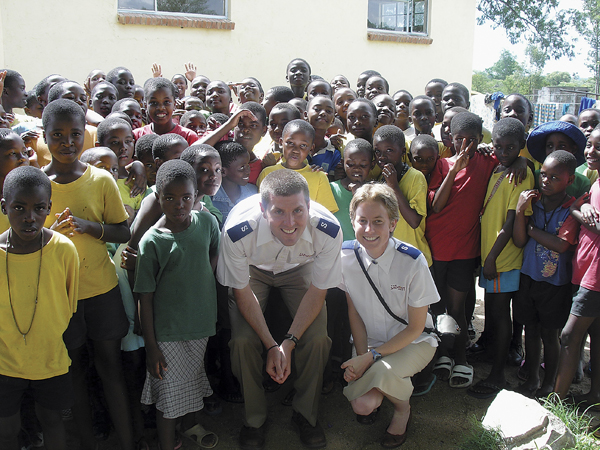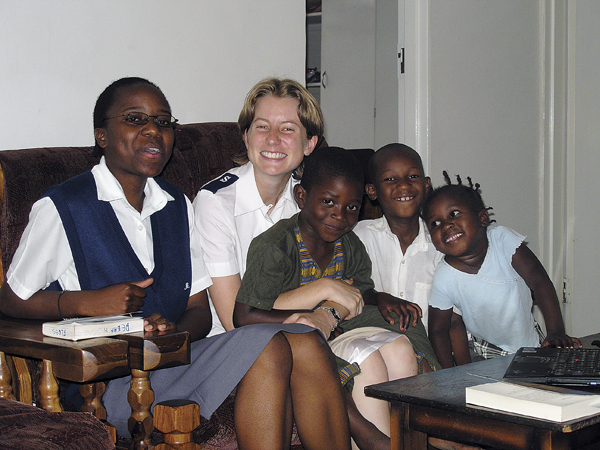 Imagine you’re black, and you’re walking down the street in Toronto when someone walks right up to you, shouts “Black person!†to your face and then keeps walking. Strange? Racist? You think it would never happen?
Imagine you’re black, and you’re walking down the street in Toronto when someone walks right up to you, shouts “Black person!†to your face and then keeps walking. Strange? Racist? You think it would never happen?
My husband, John, and I have lived in Harare, Zimbabwe, for 18 months now. Although we have been a bit lax in our studying, we have managed to learn some of the local language. One of the first Shona words we learned when we moved to Zimbabwe was murungu-it means “white person†or “British person†or sometimes just “boss.†We hear this word a lot. In downtown Harare, I have people walk right up to my face and shout “Murungu!†before they keep walking on. Talk about stating the obvious! Whenever we go to the rural areas, hordes of children will yell out “Murungu! Murungu!†as we drive or walk by. Often I will overhear murungu interspersed in a conversation that is happening close to me.
I can safely say that I hate being called murungu. I don’t mind it when kids use the word-it is often followed by peals of laughter and said in innocence. But it’s different when I hear it from adults-especially adults that I know and consider friends.
Part of the Family
One of the biggest delights about moving to Zimbabwe has been becoming part of a huge, extended family. From the day I moved here, people started calling me mwanangu, which means “my child.†John is everyone’s mukuasha (“son-in-lawâ€) and he has more mothers-in-law than he ever thought possible!
It has been wonderful to be welcomed into our Zimbawean family by a whole host of mothers, fathers, grandmothers, aunts and uncles. Being called mwanangu makes me feel that I belong, that I have a family, that I am accepted and loved. I love when people say “You are one of us,†because that is what we came to Zimbabwe for-to share life, to belong, to be one.
Yet there is always the lingering murungu accusation that makes us feel like outsiders. Mwanangu says “You are ours. You are one of us.†It includes. But when someone says murungu it is a reminder that we are separate, different, other. It excludes. That may not be the intention. But it’s how it comes across. Whether consciously or subconsciously, the classification of “in†and “out†happens because of the language that we choose.
 I don’t think people usually say murungu with malice. It is just an identifying term that states an obvious fact. I am indeed a white person. I cannot tell you, however, the pain of hearing a friend-someone I trust and share my heart with-referring to me in conversation simply as murungu-“white person.†Not Rochelle. Not friend. Not sister. Not daughter. Not human being. Just “white person.†Just different from us. It is painful and feels like betrayal. Yet how many times have I done the exact same thing? How many times have I referred to my friends as “non-Christian†or “Chinese families†or “newcomers to Canada†or “from broken homes†or “homeless†or any other classification that lumps people together discriminately in categories that I have chosen?
I don’t think people usually say murungu with malice. It is just an identifying term that states an obvious fact. I am indeed a white person. I cannot tell you, however, the pain of hearing a friend-someone I trust and share my heart with-referring to me in conversation simply as murungu-“white person.†Not Rochelle. Not friend. Not sister. Not daughter. Not human being. Just “white person.†Just different from us. It is painful and feels like betrayal. Yet how many times have I done the exact same thing? How many times have I referred to my friends as “non-Christian†or “Chinese families†or “newcomers to Canada†or “from broken homes†or “homeless†or any other classification that lumps people together discriminately in categories that I have chosen?
All God’s Children
Moving to Zimbabwe has made me much more aware of the power of labels we put on other people: immigrant, woman, refugee, victim, friend, brother, Canadian, non-Christian, sinner, dysfunctional, homosexual. We likely use these words to state the obvious and to provide clarity for ourselves and others. But by using the labels, we are categorizing people for ourselves and them-letting them know whether or not they are included or excluded.
As Christians, we believe that we are all God’s children, and therefore brothers and sisters. The words we use, however, often belie this truth. We want our churches to be open and welcoming to “non-Christians†or “non-believers.†As The Salvation Army, we have a special interest in helping the “poor†or the “marginalized.†Yet through these words-said aloud or just in our minds-we are placing ourselves apart from them-those to whom we minister, to whom we reach out, who are somehow different from us.
Perhaps part of our labelling comes from a reaction to the rejection we feel from the world. When we get saved, we are a new creation, and that often translates into rejection from the world-particularly in a secular society like Canada. As Christians, we are often labeled “crazy,†“fanatical,†“bigoted,†“intolerant,†“unintelligent†or other disparaging terms. Perhaps this makes us more inclined to use our own labels of “sinner,†“non-Christian,†“worldly†or “un-churchedâ€on others. Perhaps our labels on the “needy,†“victims†or “poor†come from a need somewhere within us to separate ourselves from the horrible thought that, apart from grace or luck, we could have ended up in their circumstances.
A few years ago my Salvation Army workplace got free tickets to a Thanksgiving dinner at a fine dining restaurant. I went with several of the clients I worked with, and was completely mortified at the speeches that were given. Various speakers got up and thanked people for their generous contributions to this dinner for the homeless, the needy, the hopeless. It may have been good for public relations. But it was terrible for the self-worth of those of us who were meant to enjoy a nice meal but instead had negative labels stuck on us.
How often does this happen in our corps or social institutions? How often do we sacrifice people’s dignity for public funding, or for the ease of using words we are familiar with and the excuse that “political correctness has gone too far�
We have a subconscious need to categorize people, and the world will always find ways to divide us into “us†and “them.†But God has called us to the royal “we,†a huge “usâ€-a family of God that does not ignore our differences but unites us all in spite of them. We are all mwanangu-children of God. Let’s not allow labels to keep us from embracing one another as brothers and sisters in Christ.
by Rochelle McAlister, Territorial HIV/AIDS Co-ordinator, Zimbabwe Territory